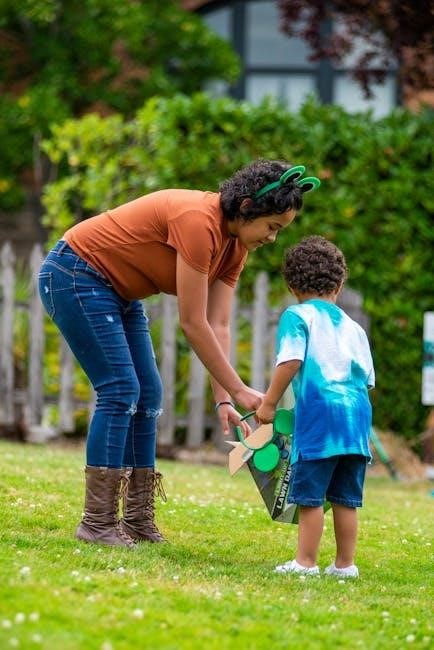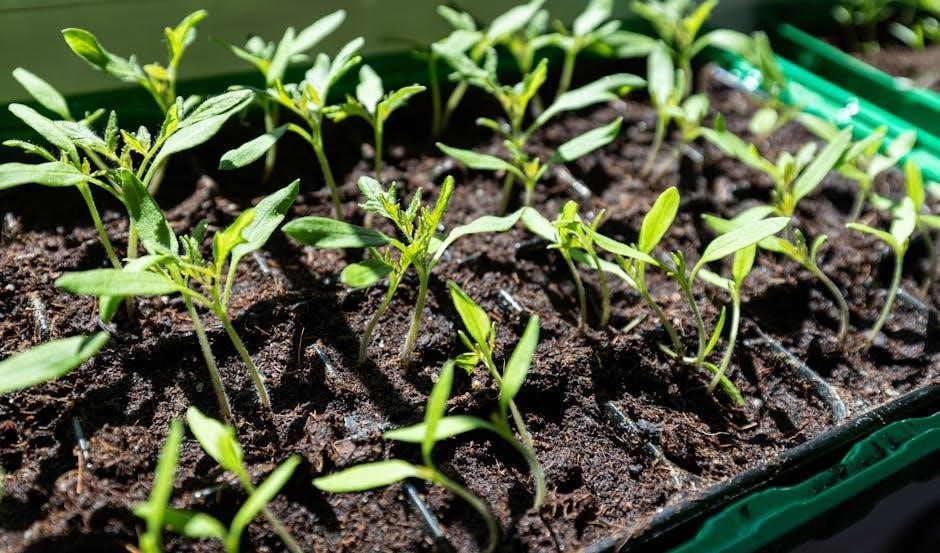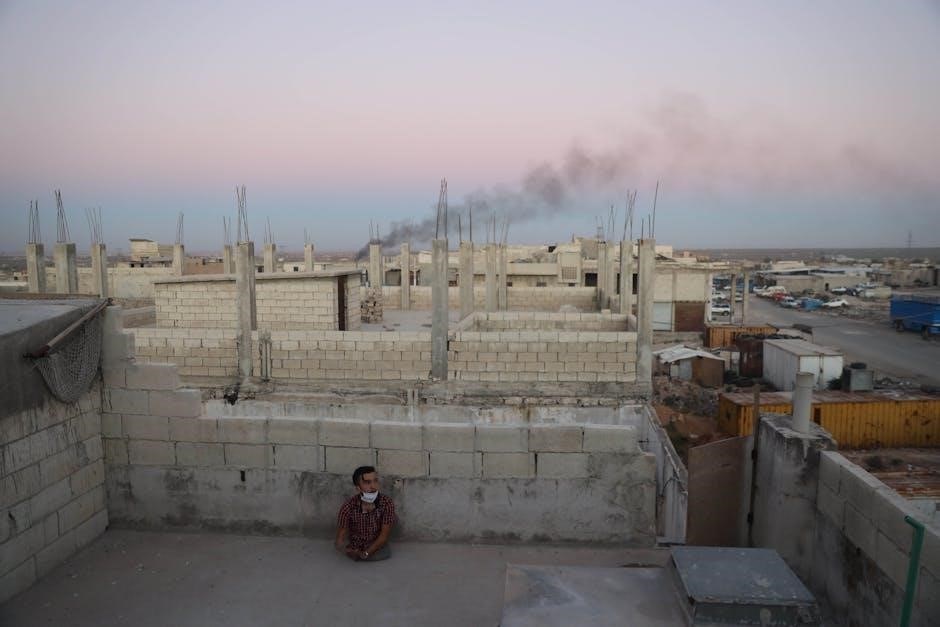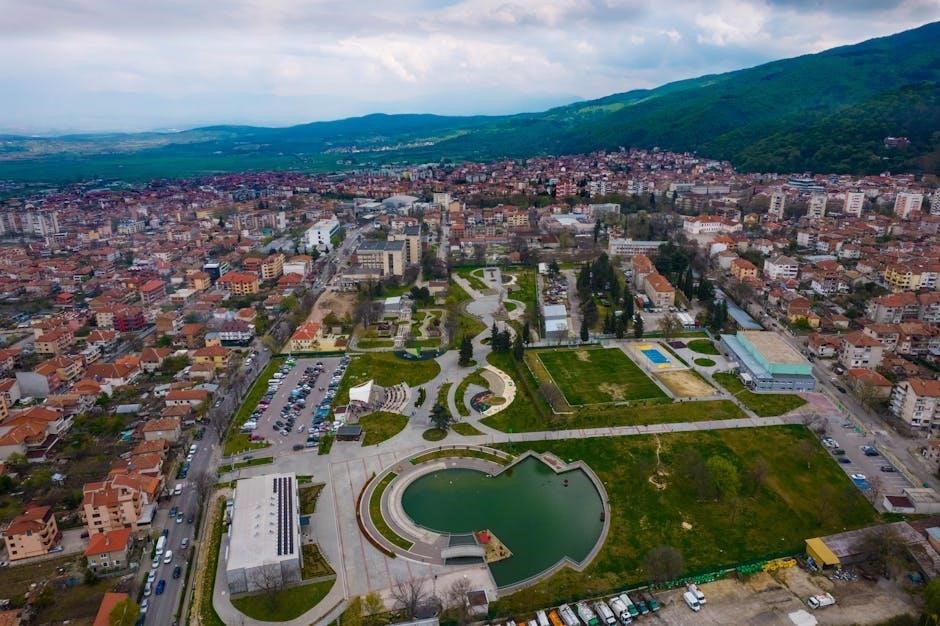Life span development explores human growth from birth to old age‚ emphasizing physical‚ cognitive‚ and psychosocial changes. It highlights the integration of emotions and cognition across stages.
1.1 Definition and Scope of Life Span Development
Life span development is the scientific study of human growth and development across the entire life span‚ from birth to old age. It examines physical‚ cognitive‚ and psychosocial changes‚ emphasizing the integration of emotions and cognition. This field is multidimensional‚ covering various domains and stages‚ providing a comprehensive understanding of human development from infancy to late life.
1.2 Importance of Studying Life Span Development
Studying life span development is crucial for understanding human growth and optimizing well-being across all ages. It informs practices in education‚ healthcare‚ and social policies‚ helping to address developmental challenges and promote healthy aging. This knowledge enhances our ability to support individuals at every stage‚ fostering resilience and improving quality of life from infancy to old age.
Key Themes of Life Span Development
Life span development emphasizes multidimensional‚ multidirectional growth‚ highlighting the interplay of biological‚ psychological‚ and environmental factors across all life stages.
2.1 Life-Span Perspective: Multidimensional and Multidirectional Development
The life-span perspective views development as a lifelong‚ multidimensional process‚ emphasizing the dynamic interaction of biological‚ psychological‚ and environmental factors. It highlights growth‚ stability‚ and change across all stages‚ recognizing that development is multidirectional‚ with gains and losses occurring at different points in life. This approach underscores the complexity and continuity of human development.
2.2 Plasticity and Contextual Influences on Development
Plasticity refers to the brain’s ability to adapt and change throughout life‚ influenced by environmental and cultural contexts. Contextual factors‚ such as family‚ education‚ and socioeconomic status‚ shape developmental trajectories‚ highlighting the interplay between nature and nurture. This dynamic interaction underscores the role of external influences in fostering resilience and adaptability across the life span.

Theoretical Perspectives in Life Span Development
Theoretical perspectives‚ such as psychoanalytic‚ cognitive‚ and sociocultural approaches‚ provide frameworks for understanding development. These theories explore the interplay of genetic and environmental influences across the life span.
3.1 Nature vs. Nurture: Understanding Developmental Influences
The debate between nature (genetic factors) and nurture (environmental influences) is central to life span development. Research shows both contribute to growth‚ with nature providing a foundation and nurture shaping outcomes. This interaction influences physical‚ cognitive‚ and psychosocial development across stages‚ highlighting the complexity of human growth from infancy to old age.
3.2 Major Theories: Psychoanalytic‚ Cognitive‚ and Sociocultural Approaches
Psychoanalytic theory‚ led by Freud‚ emphasizes unconscious thoughts and stages like the Oedipus complex. Cognitive theories‚ such as Piaget’s‚ focus on mental development stages. Sociocultural approaches‚ like Bronfenbrenner’s ecological systems‚ highlight cultural and environmental influences. These frameworks provide diverse perspectives on human development‚ shaping our understanding of growth and behavior across the life span.

Stages of Life Span Development
Life span development encompasses stages from infancy to old age‚ each marked by unique physical‚ cognitive‚ and psychosocial milestones. Continuous growth and change characterize human development.
4.1 Infancy and Early Childhood: Foundations of Development
Infancy and early childhood are critical periods marked by rapid physical growth and cognitive development. During this stage‚ foundational skills such as language acquisition‚ motor abilities‚ and emotional regulation emerge. These early experiences shape future developmental trajectories and are influenced by both genetic and environmental factors‚ emphasizing the importance of nurturing care and stimulation.
4.2 Adolescence‚ Adulthood‚ and Old Age: Continuous Growth and Change
Adolescence‚ adulthood‚ and old age are marked by continuous growth and change. Adolescence brings physical and psychological transformations‚ while adulthood focuses on career‚ relationships‚ and personal growth. Old age involves reflection‚ adaptation to declining health‚ and emotional resilience. Each stage builds on previous experiences‚ highlighting the dynamic and lifelong nature of human development.

Factors Influencing Life Span Development
Biological‚ environmental‚ sociocultural‚ and economic factors shape human development across the life span‚ influencing physical‚ cognitive‚ and psychosocial growth at every stage.
5.1 Biological and Environmental Factors
Biological factors‚ such as genetics and aging‚ significantly influence development‚ while environmental factors‚ like family and socioeconomic status‚ shape growth. Both interact to impact physical‚ cognitive‚ and emotional development across the life span‚ with health disparities emerging as individuals age.
Sociocultural factors‚ including family‚ education‚ and cultural norms‚ profoundly shape development. Economic influences‚ such as access to resources and socioeconomic status‚ also play a critical role. These factors interact to create diverse developmental pathways‚ impacting opportunities‚ health‚ and well-being across the life span.
Research Methods in Life Span Development
5.2 Sociocultural and Economic Influences
Sociocultural factors‚ including family‚ education‚ and cultural norms‚ significantly influence development. Economic status affects access to resources and opportunities‚ shaping health and well-being across the life span. These factors interact to create diverse developmental pathways‚ impacting cognitive‚ emotional‚ and social growth. Understanding these influences is crucial for optimizing human development and addressing disparities.
6.1 Longitudinal and Cross-Sectional Studies
Longitudinal studies track the same individuals over time‚ capturing developmental changes and continuity. Cross-sectional studies compare different age groups at a single point in time. Both methods provide insights into human development‚ with longitudinal designs offering depth and cross-sectional studies providing breadth. These approaches help researchers understand growth patterns‚ identify trends‚ and address challenges in lifespan development research effectively.
6.2 Ethical Considerations in Developmental Research
Ethical issues in developmental research include ensuring informed consent‚ especially with vulnerable populations like children and the elderly. Confidentiality and minimizing harm are critical. Researchers must balance scientific goals with participants’ well-being‚ adhering to ethical guidelines to protect autonomy and dignity across all life stages‚ fostering trust and integrity in the research process.

Emotional and Cognitive Development Across the Life Span
Emotional and cognitive development span a lifetime‚ integrating emotion and cognition‚ with equilibrium theory explaining their interplay from birth to old age.
7.1 Emotional Development: From Infancy to Old Age
Emotional development spans a lifetime‚ evolving from basic emotions in infancy to complex emotional regulation in adulthood. Infants exhibit primitive emotions like fear and joy‚ while children develop empathy and self-awareness. Adolescents experience heightened emotional intensity‚ and adults achieve emotional stability. In old age‚ emotional resilience is tested by loss‚ yet wisdom and life experience often enhance emotional well-being and intelligence.
7.2 Cognitive Development: Stages and Changes
Cognitive development progresses through distinct stages‚ from infancy to old age. Infants develop sensorimotor skills‚ while children acquire language and problem-solving abilities. Adolescents refine executive functions‚ and adults reach cognitive peak. In old age‚ some declines in processing speed occur‚ but wisdom and experience often compensate‚ enhancing decision-making and emotional intelligence‚ reflecting a lifelong evolution of mental capabilities and adaptability.

Social and Emotional Development
Social and emotional development encompasses the growth of relationships‚ emotional intelligence‚ and social competence‚ crucial for understanding human behavior and well-being across the life span.
8.1 Social Competence and Relationships
Social competence involves skills for effective interactions‚ fostering healthy relationships across life stages. From infancy to adulthood‚ emotional intelligence and empathy evolve‚ enhancing communication and collaboration. These abilities are crucial for building trust‚ resolving conflicts‚ and maintaining connections‚ ultimately contributing to overall well-being and life satisfaction.
8.2 Emotional Intelligence and Well-Being
Emotional intelligence involves recognizing‚ understanding‚ and managing emotions‚ enhancing interpersonal relationships and mental health. It fosters resilience‚ empathy‚ and self-awareness‚ contributing to overall well-being. Across the life span‚ higher emotional intelligence correlates with better coping strategies‚ life satisfaction‚ and healthier relationships‚ emphasizing its role in promoting psychological and social well-being at every stage of development.

Applications of Life Span Development Knowledge
Life span development knowledge informs education‚ child development programs‚ and mental health interventions‚ guiding professionals in health‚ education‚ and psychology to support individuals across all life stages effectively.
9.1 Education and Child Development Programs
Life span development knowledge informs educational strategies‚ optimizing learning environments and child development programs. These programs focus on fostering physical‚ cognitive‚ and psychosocial growth‚ ensuring tailored support across age groups. Evidence-based approaches enhance developmental outcomes‚ promoting social-emotional learning and academic success. By integrating developmental theories‚ educators design interventions that address individual needs‚ fostering resilience and lifelong skills for children and adolescents;
9.2 Mental Health and Interventions Across the Life Span
Mental health interventions across the life span are tailored to address age-specific challenges‚ promoting emotional well-being and resilience. From infancy to old age‚ understanding developmental stages informs effective strategies‚ enhancing cognitive and psychosocial functioning. Life-span development research emphasizes early interventions‚ supporting individuals through critical transitions and fostering adaptive coping mechanisms to ensure optimal mental health outcomes across all life stages.
Future Directions in Life Span Development Research
Emerging trends include integrating advanced technologies like AI and neuroscience to study human development. Global perspectives and interdisciplinary approaches will enhance understanding of lifespan developmental processes.
10.1 Emerging Trends and Technologies
Advancements in AI‚ neuroscience‚ and big data analytics are revolutionizing lifespan development research. These technologies enable deeper insights into cognitive and emotional changes across ages‚ fostering personalized interventions. Additionally‚ wearable devices and longitudinal studies provide richer data‚ enhancing our understanding of developmental processes and improving mental health support across the lifespan.
10.2 Global Perspectives on Developmental Science
Global perspectives highlight cultural and socioeconomic variations in development‚ emphasizing cross-cultural studies. Researchers explore how regional differences shape developmental milestones‚ influenced by globalization and migration. These insights foster collaborative efforts to address universal challenges‚ such as education and mental health‚ promoting a holistic understanding of human development across diverse contexts and populations worldwide.
Life span development explores human growth across all stages‚ emphasizing physical‚ cognitive‚ and psychosocial changes. It highlights the integration of emotions and cognition‚ shaping overall well-being.
11.1 Summary of Key Concepts
Life span development is a multidimensional and contextual process‚ encompassing physical‚ cognitive‚ and psychosocial growth across all stages. It emphasizes plasticity and continuous change‚ highlighting the integration of emotions and cognition. Understanding these concepts provides insights into human growth‚ optimizing well-being from infancy to old age.
11.2 The Significance of Life Span Development in Understanding Human Growth
Life span development provides a comprehensive understanding of human growth‚ emphasizing adaptability and continuous change across stages. It highlights the interplay of biological‚ psychological‚ and sociocultural factors‚ offering insights into optimizing well-being and fostering resilience. This perspective is essential for addressing challenges and promoting healthy development from infancy to old age.
References and Further Reading
Key resources include textbooks like Human Development: A Life-Span Approach and journals such as Developmental Psychobiology; Online guides and PDFs provide additional insights and research materials.
12.1 Recommended Textbooks and Journals
Recommended textbooks include Human Development: A Life-Span Approach and The Handbook of Life-Span Development. Journals like Developmental Psychobiology and Psychology and Aging provide cutting-edge research. The Study Guide for Test 3 for Lifespan Development and resources from Docsity are also valuable. These materials offer comprehensive insights into life span development‚ catering to both students and professionals in the field.
12.2 Online Resources and PDF Guides for Life Span Development
Several online resources and PDF guides are available for studying life span development. The Study Guide for Test 3 for Lifespan Development on Docsity offers valuable exam preparation materials. Additionally‚ PDF versions of The Handbook of Life-Span Development and other academic papers can be accessed through platforms like ResearchGate and Google Scholar‚ providing in-depth insights into developmental theories and research.



0 Comments